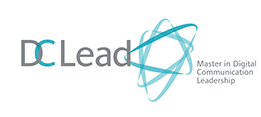The Master in Digital Communication Leadership (DCLead) is a prestigious Erasmus Mundus Joint Master Degree (EMJMD), co-founded by the European Union and organised by four European Universities.
The Master approaches the vast and recent field of digital communication from an interdisciplinary and international point of view bringing together advanced academic discussion with practical knowledge and skills. The programme promotes a non-techno-deterministic, social and ethical reflection on digital communication for future leaders of the field.
The students of the Master are selected for participation in one of the tracks of the programme (POLINN, TECMAN, ICT4D), depending on their choice, their qualifications and the positive assessment of the selection committee.
DC Lead is also offered in collaboration with our academic and internship partners.
After conducting its own examination, the Dutch accreditation agency NVAO officially accredited DCLEAD in October 2022, aligning with the regulations outlined in the Framework for the European Approach for Quality Assurance of Joint Programmes.
All courses are held in English.
The Master in Digital Communication Leadership is awarded to the students that obtain 120 ECTS credits, including 30 for their master thesis. These credits are earned by successfully passing the examinations of the various courses and modules.
For completing the study track POLINN, the students will be awarded the academic degree of “Master of Arts”, abbreviated “MA”, jointly by PLUS (Paris Lodron University of Salzburg) and VUB (Vrije Universiteit Brussel, Belgium).
Students of TECMAN will be awarded the academic degree of “Master of Science”, abbreviated “MSc”, jointly by PLUS (Paris Lodron University of Salzburg) and AAU (Aalborg Universitet, Denmark).
For completing the study track Information and Communication Technology for Development, or “ICT4D”, graduates of the programme Digital Communication Leadership (DCLead) are awarded the academic degree of “Master of Science”, abbreviated “MSc”, and MSc International Development Studies awarded by WU (Wageningen University)
The Master is organised in four semesters in different locations:
- All students spend the first semester and the Summer School periods at PLUS.
- Students selected for the track POLINN spend the second and third semester at VUB.
- Students selected for the track TECMAN spend the second and third semester at AAU.
- Students selected for the track ICT4D spend the second and third semester at WU.
- The fourth semester is the semester of the individual mobility periods. Individual mobility periods can be spent at any of the four consortium partners (PLUS, VUB, AAU or WU).
The following sections will explain the structure of the semesters in detail.
Students kick off their participation in the Master in Digital Communication Leadership with a summer symposium organized by Paris-Lodron University of Salzburg. The summer symposium is an annual event that includes seminars, meetings between students and representatives of all the partners, and meetings between new and current students. The participants also spend their first semester at Paris-Lodron Universität Salzburg, where they attend introductory courses including courses on methodology, various topics within the field of communication, and a module on ethics and responsible innovation. The introductory courses, as well as the specialisation tracks are informed and shaped by the Problem and Project Based Learning (PBL) methodology. Therefore, they consist of taught elements and projects that participants conduct in groups, under the guidance of academics and, where applicable, in collaboration with industry partners.
After the first semester, the students start their specialisation tracks and mobility period in Brussels (VUB), Copenhagen (AAU) or Wageningen (WUR). Students are asked to express their preference regarding one of the tracks when they apply for the programme.
Please have a look at the page dedicated to the specific track of your interest to find out more details about the structure of this semester.
Participants of the Master in Digital Communication Leadership start their third semester by attending the Summer School II in Salzburg, Austria. In their third semester, students must also present the concepts of their master thesis to a panel of experts and to fellow students. After the summer symposium, the participants complete the tracks POLINN, TECMAN or ICT4D started in semester two.
Please have a look at the page dedicated to the specific track of your interest to find out more details about the structure of this semester.
In the fourth semester, the students work on their master thesis (30 ECTS). This master thesis is co-supervised by two academics from two different institutions of the consortium awarding the degree. The students have also the possibility to spend their fourth semester as guests of one of the higher education partner institutions (in Australia, Austria, Belgium, Brazil, China, Denmark, Ghana, or United States) or as an intern at one of the industry partners (in Austria, Belgium, Denmark, or Germany). Such a choice has to be communicated to, and approved by, the Programme Board, which assess the relevance of such request against the subject of the master thesis. Common standards for the master thesis are determined by the curriculum. In order to graduate, the students need to successfully defend their master thesis at the DCLead Summer Symposium, when they will be assessed by a commission of representatives of (at least) the three different partner institutions.


